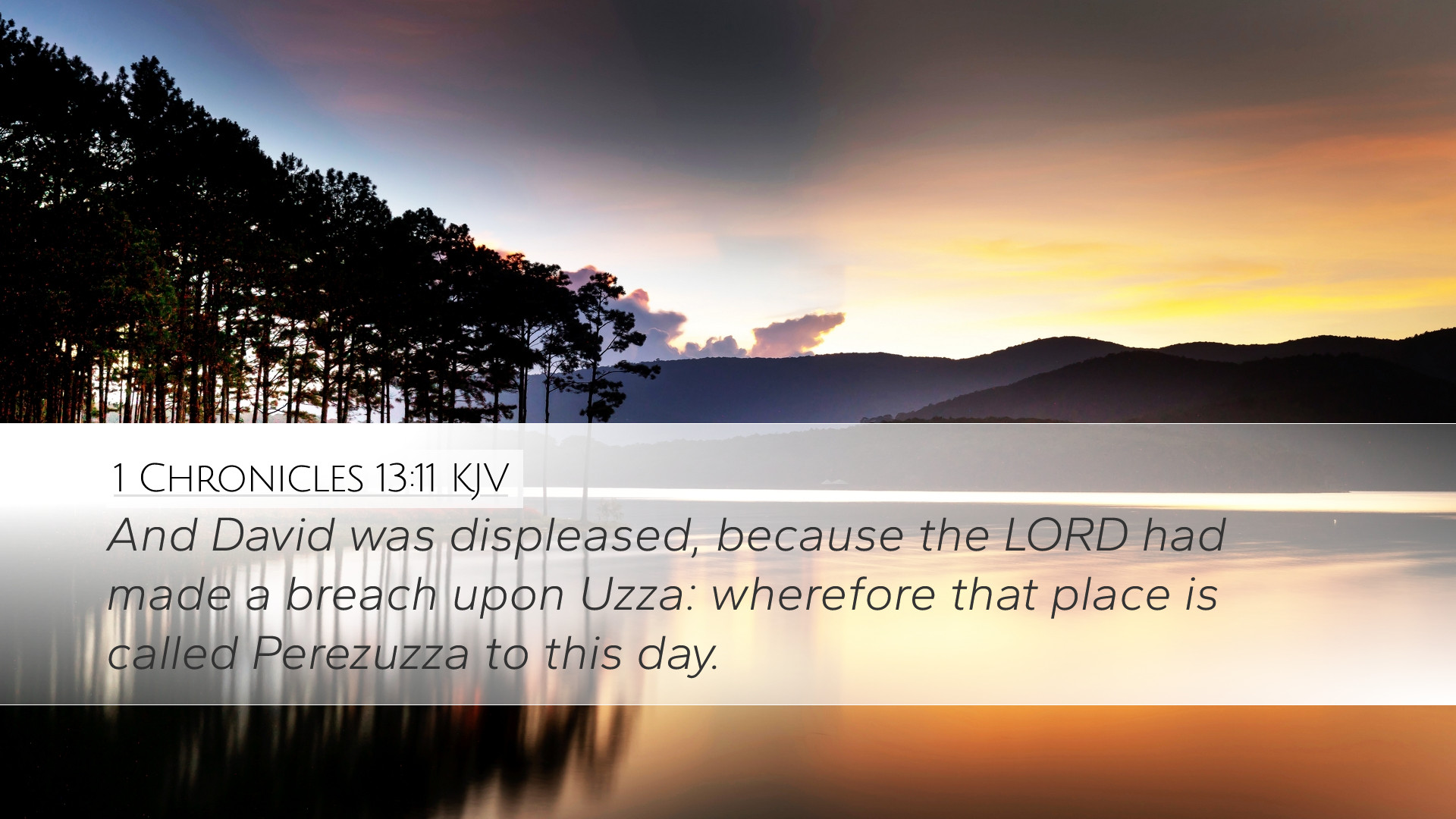Commentary on 1 Chronicles 13:11
Verse: "And David was displeased because the LORD had made a breach upon Uzza: and he called the name of the place Perez-Uzza, to this day." (1 Chronicles 13:11)
Introduction
This passage occurs within a narrative that highlights David's intentions regarding the Ark of the Covenant. In his eagerness to bring the Ark to Jerusalem, David made hasty decisions without observing the proper protocols set forth by God. This incident serves as a significant lesson on reverence and obedience to divine commandments.
Exegesis and Commentary
Historical Context
The Ark of the Covenant, representing God's presence among His people, had been neglected and was housed in the house of Abinadab for many years. David aspired to unite Israel under one throne and deemed it essential for the Ark to reside in the City of David, thus signifying God’s authority over the nation.
Uzza’s Action and God’s Response
When the oxen pulling the cart stumbled, Uzza reached out to steady the Ark. His intentions were likely noble; however, his action was a breach of the Law, which explicitly forbade unauthorized handling of holy things. This act of irreverence led to Uzza's immediate death at the hands of divine judgment.
David's Displeasure
David's response, as stated in the text, was one of displeasure. According to Matthew Henry, this indicates a complex emotional state wherein sorrow meets frustration, revealing David's initial misunderstanding of God's holiness and the seriousness of divine laws. Henry emphasizes that David's displeasure stemmed from a mixture of grief for Uzza and confusion about God's harsh punishment.
Albert Barnes points out that this event caused David to reconsider his approach to worship and reverence. In the wake of tragedy, David recognized that the absence of prescribed procedures in his zealous endeavor led to disastrous consequences. This moment of reflection was crucial for the future of Israel's worship.
Analyzing "Perez-Uzza" - The Breach of Uzza
The renaming of the place as "Perez-Uzza," meaning "the breach upon Uzza," underscores the weight of the incident. According to Adam Clarke, naming places in the Biblical narrative often signifies a memorial, a marker for future generations to remember God’s holiness and the seriousness of obedience. Clarke asserts that this renaming served not only as a reminder to David and the nation but also as a warning of the fatal consequences that arise from disregarding God’s commands.
Theological Implications
Holiness of God
This passage conveys profound insights regarding the holiness of God and His expectations of reverence from His people. Matthew Henry remarks that Uzza’s fatal error was a failure to acknowledge the weightiness of God’s presence and the protocol established by Him. The narrative prompts readers to consider the contemporary implications of treating sacred matters with the utmost seriousness.
Leadership and Worship
David, as a leader, had a responsibility to ensure that worship practices accurately reflected God's commands. Albert Barnes emphasizes that this event is indicative of the critical nature of godly leadership, particularly in spiritual matters. Pastors and church leaders today must seek to align their worship and practices with biblical principles, recognizing that deviation can have significant consequences.
God’s Sovereignty and Justice
The incident illustrates God's sovereignty and justice. His actions, though appearing harsh, serve to maintain the sanctity of His presence. Adam Clarke notes that God’s decision to strike Uzza was a clear declaration of the seriousness of approaching the divine. In light of New Testament teachings, believers are called to approach God with humility and reverence, recognizing the grace afforded through Christ while not taking His holiness lightly.
Practical Applications
- Importance of Obedience: Reflect on areas of life where personal desires might lead to neglecting God's commands.
- Understanding God's Holiness: Emphasize the need for reverence in worship and daily living.
- Leadership Accountability: Church leaders should critically evaluate their practices to ensure they align with Scripture.
- Grace and Reverence: Strive to balance the understanding of God’s grace through Christ with the call to live a life honoring His holiness.
Conclusion
1 Chronicles 13:11 serves as a poignant reminder of the importance of obedience in approaching divine matters. David's experience with Uzza highlights the need for a proper understanding of God's holiness and the significance of following His commands. For pastors, students, and theologians, this passage encourages introspection regarding worship practices and the manner in which God's presence is honored in the community of faith.


